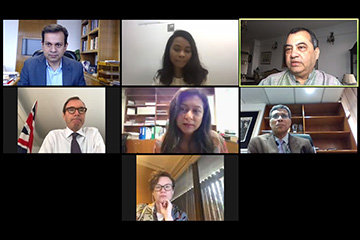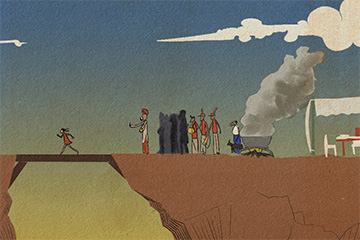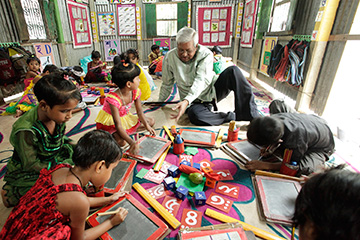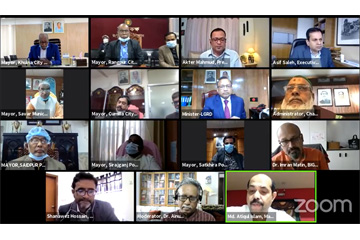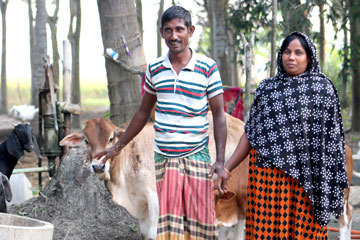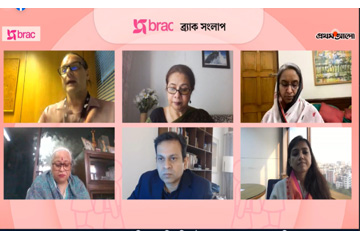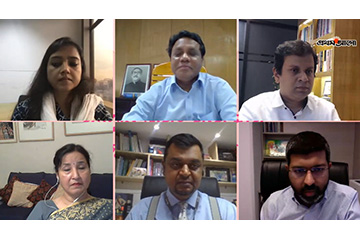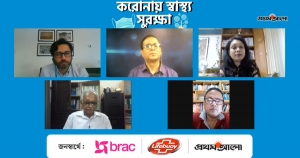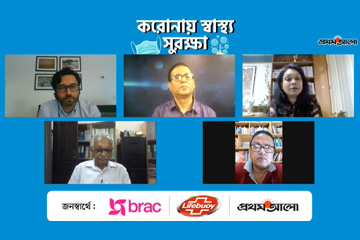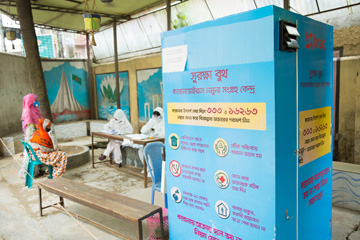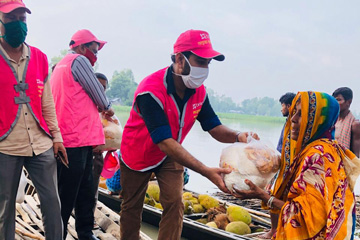
BRAC
Bangladesh has been a distinguish exemplar on how to adapt to climate change impact
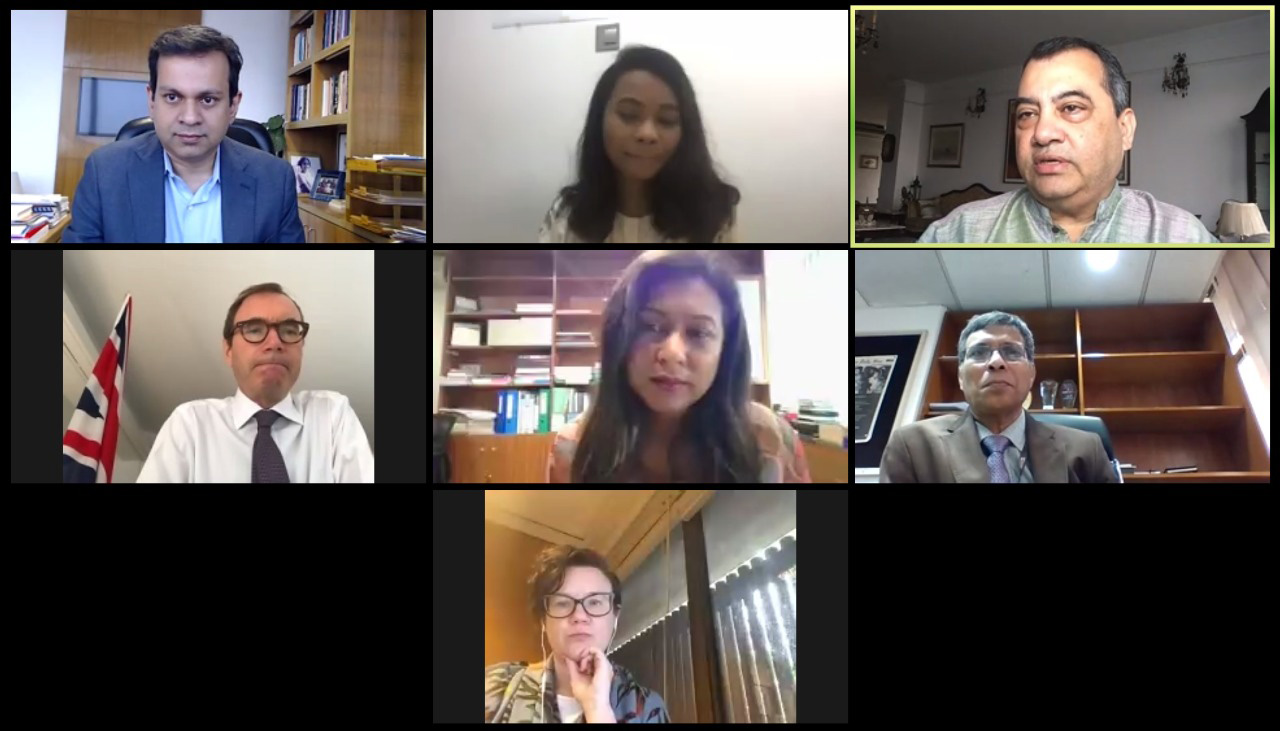
“Bangladesh has been a distinguish exemplar on how to adapt to climate change impact and the effectiveness of responding to extreme weather events and extra ordinary achievement in reducing climate change vulnerability through adaptation”This afternoon, Thursday (10 December), the British High Commissioner Robert Chatterton Dickson made the following remarks as Special Guest of the virtual launch of the book titled ‘Building Resilience to Climate Change through Craftsmanship’, organised by BRAC Climate Change Programme. He also added, “People who are most vulnerable to climate change will be made worse off in future to due to increasing climate change impact and we have been working in Bangladesh in reducing the impact through our support in various sectors access to food, Water ,sanitation, education, health.
“BRAC with Aarong is building resilience of individual by supporting artisans in order to support their families and link the village people with commercial market making it more sustainable.”
The book illustrates the ways BRAC’s sister concern, the Ayesha Abed Foundation, works to transform communities from areas at risk from climate change into ones that are resilient. The book features stories from the lives of 14 artisans, offering an insight into their sufferings due to climate change. In addition, it also goes on to portray their lives’ struggles, and how through employment at the Ayesha Abed Foundation the artisans took opportunities to utilise and maximise on their potentials and skills.
Chairman of the Standing Committee on Ministry of Environment, Forest and Climate Change, Saber Hossain Chowdhury, MP graced the webinar as Chief Guest. Chaired by Asif Saleh, Executive Director of BRAC Bangladesh, the webinar was also graced by the presence of Dr Ainun Nishat, Adviser to the Center for Climate Change and Environmental Research and Ex-Vice Chancellor of BRAC University, Tamara Hasan Abed, Managing Director of BRAC Enterprises, Kate Sangster, First Secretary of the Australian High Commission and Head of DFAT, and others.
Chief Guest Saber Hossain Chowdhury remarked “This book is not just a publication. It’s a story of Bangladesh. Bangladeshis has the natural ability to confront adversity and smile”
“Climate change impact will intensify and the recurrence of the climate hazards will increase in future. It is not practically possible to completely mitigate the impact of climate change. But we can fight through it by building our resilience and that’s exactly what BRAC has been doing.”
“Aarong is helping people to help themselves in building their resilience. Occurrence of multiple hazards at the same time is always going to test our ability to adapt to the adversity imposed by climate change. Initiative like this is what sustains Bangladesh by building the resilience of its most vulnerable people”
Partaking in the discussion on the published book, Tamara Hasan Abed, Managing Director of BRAC Enterprises, said, “The book portrays the stories of Aarong’s artisan living in climate change hotspots and greatly impacted by climate change. The stories in this book resonate the deep connection Bangladesh has both with its heritage crafts and rivers that fed this land. Climate change impact is felt by us all. These are the stories of people who are worse affected by the impact of climate change and now they have learnt to adapt and live. These are stories behind the labels that many of us have hanging in our closet”.
Kate Sangster, First Secretary of the Australian High Commission and Head of DFAT, noted “Climate change affects the poorest particularly the women and girls. What’s beautiful about this book is that it shows how decent and dignified work can help vulnerable people give back the autonomy that will help them to absorb and cushion the shocks of climate change and thus build their resilience in the process.”
Asif Saleh, Executive Director of BRAC Bangladesh and Chairperson of the webinar, reflected Bangladesh is one of the countries most vulnerable to the impacts of climate change, and the people who live in the districts showcased in this book are being hit the hardest. The stories of these artisans are testament to that, illustrating the impact that sustainable livelihoods.
Notably, the Ayesha Abed Foundation currently has 15 production centers and 696 sub-centers spread across the country where products for Aarong are manufactured. Most of these production centres are situated in areas under risk from climate change.
Book link : https://brac.net/downloads/resilience.pdf
Data underscores that gender-based violence is rising with COVID-19
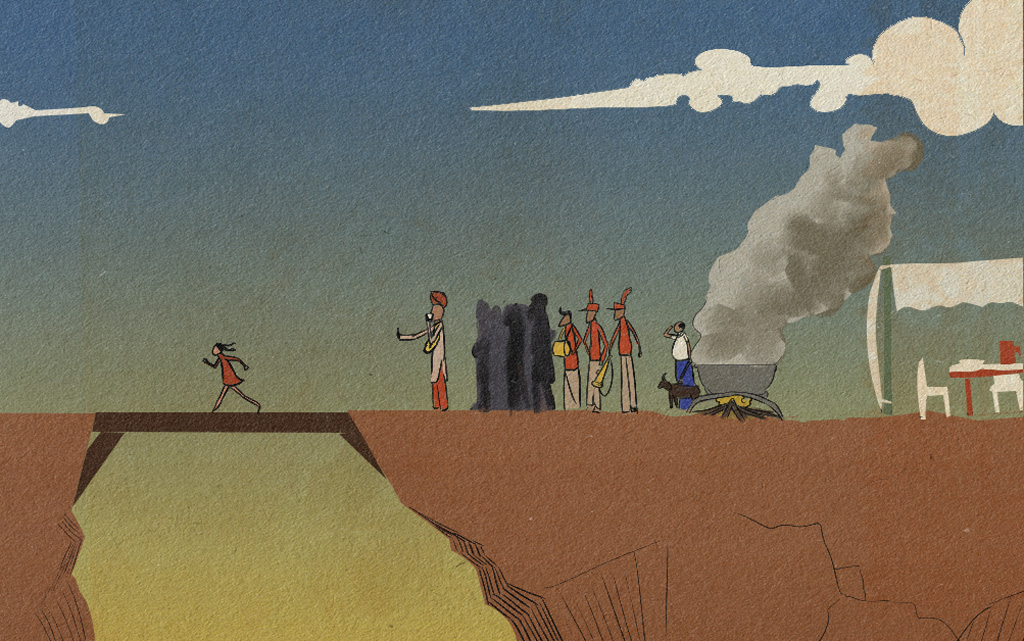
Dhaka, Bangladesh –December 1, 2020 – BRAC today released new data on gender-based violence in conjunction with 16 Days of Activism Against Gender-Based Violence. The 16 Days are recognized annually from November 25, the International Day for the Elimination of Violence against Women, to December 10, Human Rights Day. The data released by BRAC is as follows:
Over 25,000 Complaints of Gender-Based Violence were Received by BRAC Legal Aid Services in Bangladesh in the First Ten Months of 2020
Even with restricted mobility because of lockdowns for a limited time, a total of 25,607 complaints of gender-based violence were received by BRAC’s 410 Human Rights and Legal Aid Clinics across Bangladesh in the first ten months of 2020.
Of these complaints, 15,047 were resolved through alternative dispute resolution; legal counsel was provided to 3,239 survivors, and 1,724 complaints led to civil and criminal cases being filed. In addition, almost $USD 4 million in dower and maintenance was recovered for survivors.
This spike is supported by data from Polli Shomaj, BRAC’s community-based women's groups, who reported a 24% rise in incidents of gender-based violence
Polli Shomaj are active in 54 out of 64 districts in Bangladesh and work to stop violence and help women understand their rights. They reported a 24% rise in incidents of violence against women in 2020 compared to 2019.
Greater Pressure on Teenage Girls in Bangladesh to Submit to Child Marriage Amid COVID-19
The number of child marriages reported by Polli Shomaj in the first 10 months of 2020 grew by 68%, compared to the same period in 2019. There was also a 72% rise in the number of child marriages prevented by the women’s groups during the same period.
In the third quarter of 2020, with COVID-19 widespread, the number of child marriages prevented was 219% higher than the same period in 2019. The number of child marriages prevented rose by 571% from the first quarter of 2020 to the third quarter of 2020.
The quarterly comparisons are as follows:
|
Months |
Number of Child Marriages that Polli Shomaj prevented in 2019 |
Number of Child Marriages that Polli Shomaj Prevented in 2020 |
|
January- March |
96 |
79 |
|
April-June |
109 |
75 |
|
July-September |
166 |
492 |
|
Total |
371 |
646 |
The rise in child marriage is particularly concerning because child brides are more likely to experience gender based violence
Globally, girls who marry before the age of 15 are almost 50% more likely to experience physical or sexual violence from a partner than girls who married after 18. Child brides are also more likely to believe that a man is justified in beating his wife.
“Combating gender-based violence and ensuring gender equality is top priority for BRAC, and the COVID-19 pandemic is only making the fight harder,” said Asif Saleh, Executive Director, BRAC Bangladesh. “BRAC has major initiatives, highlighted above, that demonstrate that with community mobilization and awareness, significant progress can be made in tackling this challenge. During COVID-19, It is more important that ever that a more concerted commitment and effort are made from all tiers of government and society to ensure that gender-based violence is stopped and rights of women are protected.”
1st death anniversary of Sir Fazle Hasan Abed on 20 december
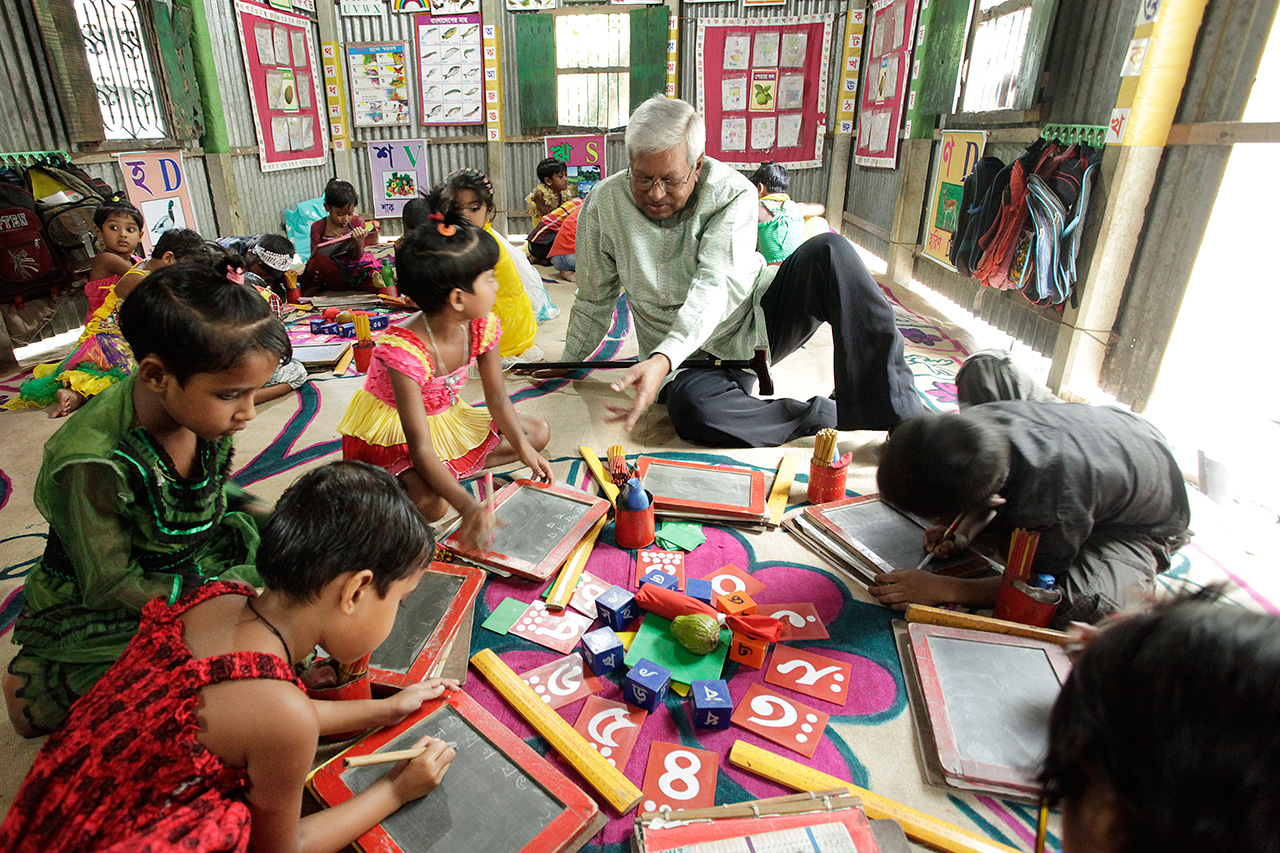
BRAC commemorates its founder Sir Fazle Hasan Abed on his first anniversary of death tomorrow on Sunday (20 December). Last year (2019) he died on this day at a hospital in Dhaka.
No elaborate events, however, will be organised to commemorate the day due to the ongoing Covid situation.
BRAC and BRAC University have organised online discussion sessions, paying respect to the vision of life and values that Sir Fazle cherished in his life. All the members of BRAC staff in their commemoration remember the eternal source of inspiration that the founder will continue to be in their life. They have pledged to stand beside the poor and marginalised communities and work hand in hand to build an equal for all.
Sir Fazle established BRAC in 1972 as a small relief and rehabilitation effort carried out in a remote area of Sylhet division. That organisation transformed itself to one of the largest and effective NGOs of the world through successful socio-economic programmes in many sectors carried out in last 47 years. BRAC now stands as a unique ecosystem interweaving microfinance, social enterprises, university, bank and multidimensional investments targeting the development of the poor and marginalised people. It now provides multifaceted services to over 100 million people in 12 countries of Asia and Africa, assisting them in bringing lasting changes in their lives.
About Sir Fazle Hasan Abed
Sir Fazle was born in 1936 in Bangladesh. He studied accountancy in London, qualifying as a cost management accountant in 1962. While he was working as a senior corporate executive at Pakistan Shell Oil, the 1970 cyclone and 1971 Liberation War in Bangladesh dramatically changed the direction of his life. He left his job and moved to London, where he helped initiate Action Bangladesh and HELP Bangladesh in support of the Liberation War.
Early in 1972, after the war was over, he returned to the newly-independent Bangladesh, finding the economy in ruins. The return of 10 million refugees who had sought shelter in India during the war called for urgent relief and rehabilitation efforts. Sir Fazle established BRAC to address the needs of refugees in a remote area of north-eastern Bangladesh, guided by a desire to help people living in poverty develop their own capacity to better manage their lives.
Today BRAC is one of the largest NGOs in the world, operating across 11 countries in Africa and Asia. Its primary objective is to empower people living in poverty and inequality. In 2020, for the fifth year in a row, BRAC was ranked first among the world’s top 500 NGOs by Geneva-based NGO Advisor; based on its impact, innovation and sustainability.
Awards and Recognition
Sir Fazle was honoured with numerous national and international awards for his achievements in leading BRAC, including the Yidan Prize for Education Development (2019), LEGO Prize (2018), World Food Prize (2015), Spanish Order of Civil Merit (2014), Inaugural WISE Prize for Education (2011), David Rockefeller Bridging Leadership Award (2008), Inaugural Clinton Global Citizen Award (2007), UNDP Mahbubul Haq Award for Outstanding Contribution to Human Development (2004), Olof Palme Prize (2001) and Ramon Magsaysay Award for Community Leadership (1980).
He has also been recognised by Ashoka as one of the ‘global greats’; and is a founding member of its prestigious Global Academy for Social Entrepreneurship. He was a member of the Commission on Health Research for Development (1987-90), the Independent South Asian Commission on Poverty Alleviation (1991-92), and the High-level Commission on Legal Empowerment of the Poor (2005-2008). In 2010, he was appointed Knight Commander of the Most Distinguished Order of St. Michael and St. George by the British Crown in recognition of his services to reducing poverty in Bangladesh and internationally. Sir Fazle was a member of the Group of Eminent Persons appointed by the UN Secretary-General in 2010 to advise on support for the Least Developed Countries. In 2014 and 2017, he was named in Fortune Magazine’s List of the World’s 50 Greatest Leaders. Sir Fazle was honoured with a Dutch Knighthood in 2019.
LGRD minister at seminar on urban development: Rural areas to be transformed into planned urban spaces to house rising urban population
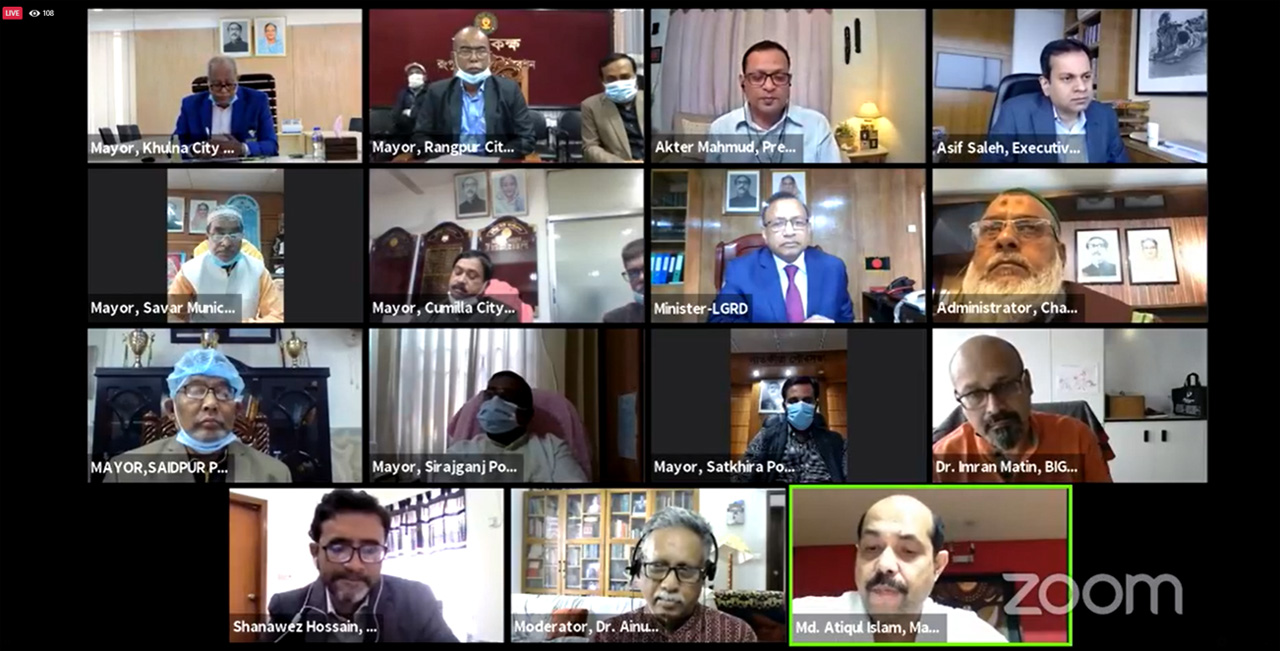
The minister for local government, rural development and cooperatives, Md Tajul Islam, stressed that the urbanisation in Bangladesh should essentially follow the direction our prime minister has given to transform the rural areas into urban spaces. “If we cannot accommodate people migrating into the urban areas we must transform the rural areas into pre-planned urban ones,” he said.
The LGRD minister made these observations in his chief guest’s speech today on Thursday (3 December) at an online seminar on housing and livelihood development of the urban poor communities.
The minister further emphasised that only putting the rising urban population into high-rises will not provide sustainable solutions until the communication is eased, and other problems related to logistics and utilities are taken care of. Therefore, urban resilience is an absolute necessity.
The seminar titled “Pro-poor, climate and disaster resilient urban development: Challenges and opportunities” was organised by BRAC Urban Development Programme (UDP) and attended by 20 city and municipality mayors from around the country.
Asif Saleh, executive director, BRAC, Professor Dr Akhter Mahmud, president, Bangladesh Institute of Planners (BIP), and Dr Imran Matin, executive director, BRAC Institute of Governance and Development (BIGD), BRAC University, also addressed the seminar, among others. Dr Ainun Nishat, Professor Emeritus, Centre for Climate Change and Environmental Research (C3ER), BRAC University, moderated the event. BIP, C3ER and BIGD also assisted in organising the seminar.
Professor Ainun Nishat appreciated the municipalities and city corporations of the country for their intent work on their development plans while drawing on own resources to address the growing challenges. He further said, “Empowerment of local government institutions, deliverable activities and social accountability are imperative for pro-poor, climate-resilient and sustainable urban development.”
DNCC mayor Atiqul Islam observed that many problems of the urban poor can be addressed through sustainable slum management in Dhaka city. While he asked for BRAC’s assistance in proper slum management in his jurisdiction, they mayor also stressed the importance of community members’ active involvement in monitoring the quality of service delivery of the city corporation staff.
Satkhira municipality mayor Md Tazkin Ahmed said trained and skilled manpower is essential for a municipality to do quality service delivery to its residents.
BRAC executive director Asif Saleh observed that for creating a robust and sustainable urban area empowerment and resource planning capacities of the local government bodies are two vital issues. “It’s important that the local authorities have been given the power to take actions in solving the local issues. Still there are issues of providing the mayors with planned budgets and required authority to approve action plans that need to be addressed. Though the condition of the capital city has improved from before as its mayors have more authorities now, it must also take place in all the other cities,” he further said.
BRAC partners with Handicap International-Humanity & Inclusion (HI) to improve the lives of people with disabilities
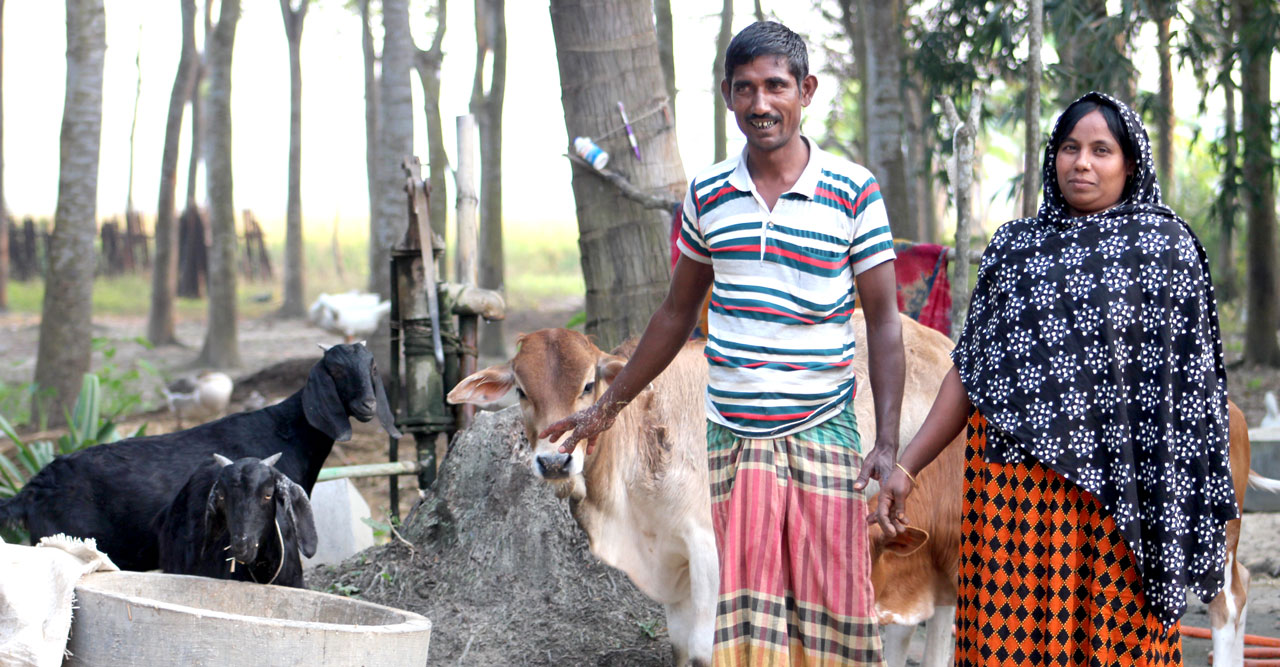
BRAC has partnered with Handicap International-Humanity & Inclusion (HI) in Bangladesh to launch a pilot disability-inclusive ultra-poor Graduation programme targeting the ultra-poor populations in four districts of Bangladesh. On 24 November 2020, Shameran Abed, Senior Director, Microfinance and Ultra-Poor Graduation initiative of BRAC, and Rajesh Chandra, Country Director of HI signed the agreement in Dhaka, Bangladesh.
BRAC has been committed to strengthening inclusion of people living in ultra-poverty as well as people with disabilities through its Graduation programme, and in 2018 collaborated with Handicap International-Humanity & Inclusion United Kingdom (UK) to bring in disability inclusion in its global programmatic activities.
In this pilot programme, HI will tailor its technical assistance to the specific needs of BRAC’s UPG programme. BRAC will implement the programme targeting 1,200 participants with disabilities or a family member with disability to enhance their socio-economic development. This two-year partnership will cater to the needs of the participants and their households during the 24-months programme cycle.
Terming the partnership between BRAC and HI as a ‘milestone’ in BRAC’s endeavour to make Graduation programme more inclusive to the most marginalised and vulnerable groups, Shameran Abed said, “The strategic partnership will strengthen our collective effort to lift people with disabilities out of ultra-poverty. This will enhance BRAC’s capacity to implement disability inclusive Graduation approach at scale in Bangladesh and globally, and assist respective governments to adapt the approach based on the country context”. Rajesh Chandra from HI also said, “Aligned with its worldwide strategy to ‘leave no one behind’, Handicap International – Humanity & Inclusion (HI) is delighted to extend in Bangladesh its global collaboration with BRAC. This technical partnership will support economic empowerment of people with disabilities in four districts of Bangladesh. HI, along with other organisations of people with disabilities aspires to support the Government of Bangladesh to ensure inclusion of people with disabilities in development”.
Since its inception in 2002, BRAC’s UPG programme has served almost 2.1 million ultra-poor households to achieve socio-economic resilience. Its groundbreaking Graduation approach has provided a proven pathway out of extreme poverty. BRAC’s work in Bangladesh is supported by Foreign, Commonwealth & Development Office (FCDO) and Australian Government’s Department of Foreign Affairs and Trade (DFAT).
School closure during covid-19 pandemic: Concerns over rising rate of school dropouts, child marriages
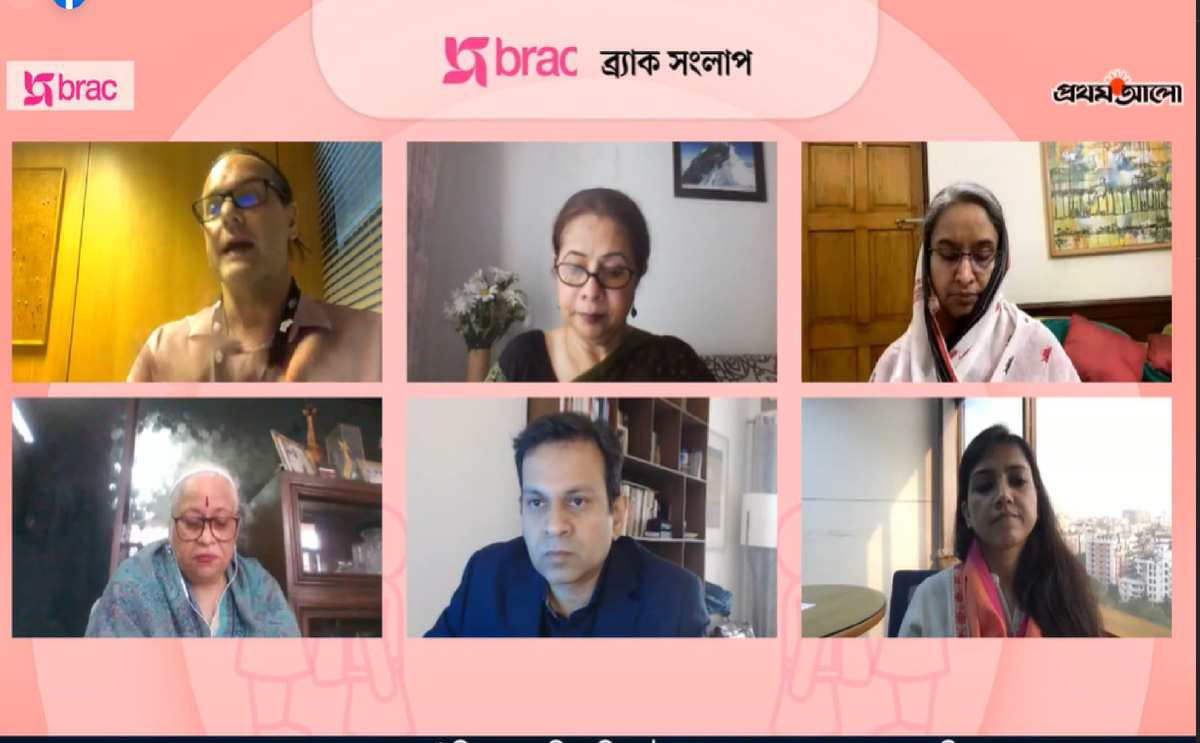
The rate of child marriage in Bangladesh is on an alarming rise as girls are mostly staying home owing to the closure of educational institutions during the COVID-19 pandemic. Bangladesh is among top10 countries in terms of child marriage rate. Moreover, the rate of child marriage has increased up to 220 per cent over the period of July-September during the ongoing pandemic. Experts are concerned that the crisis might deepen if there is a further delay in reopening schools.
Speakers came up with the expressions mentioned above in a digital dialogue organised by BRAC today, 11 October 2020, marking International Day of the Girl. Education minister Dr. Dipu Moni joined the dialogue, “Girls must return to schools,” as chief guest.
BRAC executive director (ED) Asif Saleh, Bangladesh Police Women Network (BPWN) president additional commissioner Amena Begum, rights activist and member of parliament (MP) Aroma Dutta, Rasheda K. Choudhury, ED, Campaign for Popular Education (CAMPE), Prof Dr. Sadeka Halim, Dean of Faculty of Social Sciences, University of Dhaka, social development adviser to British High Commission in Dhaka Tahera Jabeen, and Australian High Commission in Dhaka’s first secretary Simon Barclay also joined the event moderated by BRAC director Nobonita Chowdhury.
Education minister Dipu Moni said “We have reached most of our target students in case of digital classrooms. The standard of classes being taken through televisions has increased. Not only the government, but many non-government institutions are taking online classes. So, it is not mandatory that students will have to go to classes. In many countries, schools have been shut after reopening. We need to consider every aspect before deciding on reopening our educational institutions.”
On girl children, the minister said, “The birth registration process is being digitised at union levels. As a result, parents cannot fake their girls’ age and marry them off early. Important topics such as women’s repression, sexual violence is being included in our curriculum. Not only the COVID-19 crisis, we are repurposing our curriculum to tackle all sorts of challenges.”
BRAC ED Asif Saleh said, “The long closure of schools are forcing our students to forget what they have already learnt. A research in Pakistan shows a five-month closure of schools have forced students backward for 14 months. We need to consider this in terms of our country. Rather than taking a sudden decision, we need constant monitoring to reopen our schools. We can consider reopening schools in districts where the rate of infection is lower. Non-government entities are ready to assist the government in this regard.”
Lawmaker Aroma Dutta said, “Reality must be considered before taking any decision. This is true that we lost a lot during this pandemic. The rate of school drop-out has increased. We need to ensure technological and technical education for students, especially for girls, so that they can ensure their livelihood whenever needed.”
“We, especially our parents, need to change views about our girls. Very often parents force their girls into early marriage. They still believe educating girls would lead to problems for their marriage. We need to change this mentality,” Aroma added.
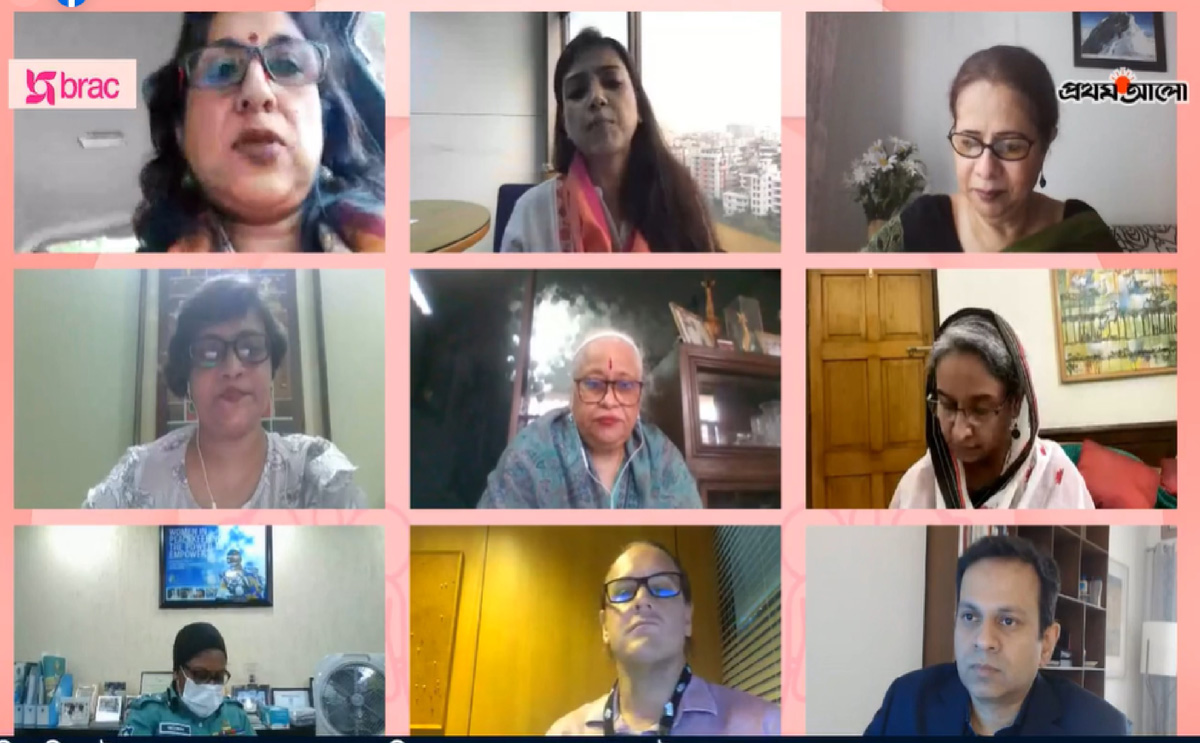
CAMPE ED Rasheda K. Choudhury said, “School closure has affected both our students and the teachers. This pandemic is acting like a magnifying glass for us. Through this, we can examine all our mistakes and think on our way forward. Before reopening schools, we need to concentrate on the related data and reality.”
She also urged the education minister to introduce incentives in the education sector like other sectors and ensure snacks for students during school hours.
Prof Sadeka Halim said, “Bangladesh has made remarkable progress in women’s empowerment and girl children’s empowerment. If you look at the millennium development goals index, our girls’ enrollment in primary schools was at par with boys. But, child marriage has been instrumental to the drop-out rate of girls.”
“During this covid-19 crisis, we have seen that our education system is closely connected to our livelihood. So, we can’t consider the education system as an isolated phenomenon. We need to think about what can be done for about 43 per cent families who have been forced under the poverty line and these families have a large number of students from schools, colleges and universities,” Sadeka Halim added.
British High Commission’s Tahera Jabeen said, “Schools have reopened in a number of countries. We need a guideline for our children and their families must be included as a stakeholder. The government and non-government and donor agencies must act in this regard”
BPWN’s Amena Begum said, “Many families think what the necessity to educate the girls is. Sometimes parents forcefully marry their girls early. Our conception on what to do was not clear at the beginning of the pandemic. To prevent early marriage people can avail services from police dialing 999. We are working on school programmes to make students aware of this. I thank the education minister for including issues like good touch and bad touch in our curriculum.”
Australian High Commission in Dhaka’s first secretary Simon Barclay said, “There is a role for both boys and the men to support the girl children to have a voice in any space—may be at school, or at mosque or temple or in cyberspace. The men and boys need to speak up to support their mothers, sisters or aunts to participate.
“Staying away from schools already increases the risks of dropping out. In terms of learning losses, when the schools reopen, both students and teachers need to intensify their efforts to address the losses. However, their return should not be at the cost of their life, so health issues must be addressed,” Barclay added.
BRAC has been playing an effective role in eliminating child marriage from grassroots to the national level. The organisation has been working as per its founder Sir Fazle Hasan Abed’s direction and implementing various projects on its own and in coordination with various government and non-government organisations to eradicate child marriage.
Impact of COVID-19 on women entrepreneurs and informal sector workers
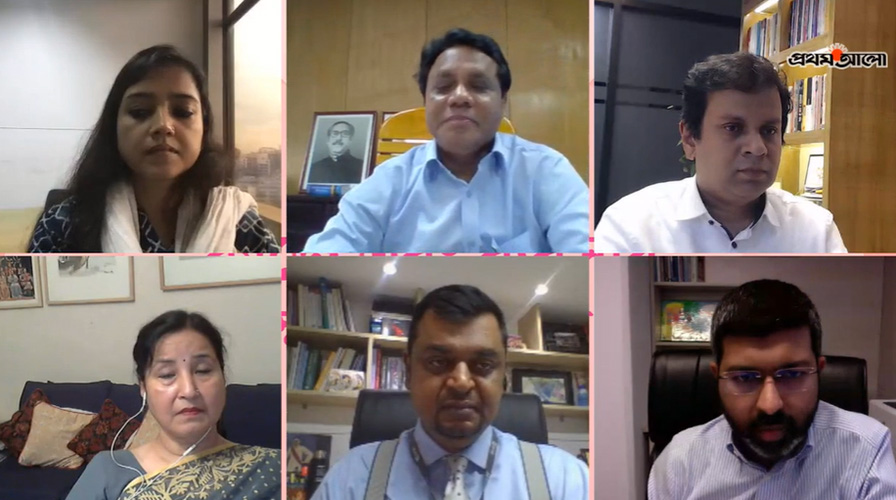
COVID-19 has forced a large number of women entrepreneurs and women working in the informal sectors to lose their income. As a result, women entrepreneurs and informal sector workers respectively faced social, economic and mental challenges, including domestic violence, lowered buying capacity and stress during the pandemic. However, these women showed resilience to fight back and recuperate from the losses they suffered.
The findings along with a number of recommendations of a study titled "Situation of women. CMSME entrepreneurs and informal sector workers: A rapid assessment and quest for recovery from losses induced by COVID-19 pandemic" were revealed at a digitally organised discussion titled “Women Affected in Workplaces and Businesses” today, on Thursday (17 September 2020).
BRAC Gender Justice and Diversity (GJ&D) Programme, with support from Advocacy for Social Change (ASC) conducted the study to look into the situation of women entrepreneurs in the cottage, micro, small and medium-sized enterprises sector and the workers who are employed in the most vulnerable informal sectors.
BRAC director Nobonita Chowdhury moderated the event joined by KM Abdus Salam, secretary to the Ministry of Labour and Employment, as chief guest. Perveen Mahmud, chairperson of UCEP Bangladesh, Ferdous Ara Begum, chief executive officer (CEO) of Business Initiative Leading Development, Rokeya Rafiq, executive director (ED) of Kormojibi Nari, Economist Nazneen Ahmed, Kohinoor Yeasmin, CEO of Tarango, BRAC ED Asif Saleh, BRAC senior directors Shameran Abed and KAM Morshed joined the discussion as panelist. KAM Morshed revealed the key findings of the survey at the beginning of the discussion.
The BRAC study found 65% women entrepreneurs had no income, while 58% women working in the informal sectors had no jobs between February and June during the government imposed holidays to tackle the onslaught of COVID-19 pandemic. As a result, women entrepreneurs and informal sector workers respectively suffered 67% and 66% decline in their personal income. Subsequently, these women (90% entrepreneurs and 84% informal sector workers) faced social, economic and mental challenges, including domestic violence, lowered buying capacity and stress during the pandemic.
A total of 1,589 respondents (589 entrepreneurs and 1,000 workers) in 174 upazilas of 28 districts covering all the administrative divisions joined the survey conducted from 8 to 24 July 2020. Of them, 32% are from rural and 68% from urban areas.
The study found one-third (33%) of the entrepreneurs had to shut their businesses and 41% had to lay off their workers during the pandemic. While 86% entrepreneurs mentioned that they could not take any measures for coping with their business-related challenges, 39% informal sector workers mentioned that they had to borrow money from friends and relatives to survive. During this period, 46% of entrepreneurs and 72% workers reported problems in their households and majority of them said they suffered acute mental stress.
It was also found the entrepreneurs each had an income loss of Tk 2,89,605 in their businesses on an average.
The stimulus package announced for enterprises by the government found to have failed for the entrepreneurs as only 29% of them had knowledge about it. Lack of proper knowledge was to be blamed for this and the majority of the entrepreneurs preferred NGOs for credit support to help their businesses.
The social safety net coverage for the informal sector workers (having zero income between February and June) also found to be inadequate as 72% workers in rural and 49% in urban areas reported that they received no assistance either from government, NGOs or private donors.
The silver lining of the survey, however, was that women entrepreneurs and informal sector workers revealed resilience and only 1% of them said they were planning to leave their previous work or businesses.
Majority (83%) of informal sector workers now expects cash support, while 79% entrepreneurs want credit at easier terms and lower rates of interest to fight back. They also recommended dedicated stimulus packages for women and suggested declaring gender-related services as essentials. Most of the respondents also stressed the need for skills development training both for entrepreneurs and workers.
What the panelists say:
Addressing the discussion, chief guest KM Abdus Salam said the government is bringing about strategic changes in forming different policies.
“Agriculture, industries and other sectors are receiving massive stimulus packages. Karmasangsthan Bank and some other banks are now disbursing loans. We expect the real picture of poverty will be changed by December and we will be able to fight back again,” Secretary Salam added.
Economist Nazneen Ahmed highly appreciated the fact that the survey prioritised cottage, micro and small enterprises and workers involved in these sectors.
“Specific household surveys on entrepreneurs and workers will obviously bring out the actual scenario. If needed, NGOs can be brought in to distribute the stimulus package among those who actually need assistance to tackle the crisis,” she said.
BRAC ED Asif Saleh said, “If we are determined to overcome the crises we have been facing in the past four to five months, the country will definitely move ahead from its present state. We need to ensure issues such as reaching timely assistance to places where those are needed, stopping violence against women and preventing school dropouts.”
Our government, social organisations and NGOs need to work together to ensure that marginalised groups like women do not get rather more marginalised in this crisis, Saleh added.
BRAC senior director Shameran Abed said, “Women entrepreneurs of small and medium enterprises don’t usually get loans from banking institutions. Those from micro enterprises don't even get the chance to knock banks for loans. NGOs need to work in these aspects, but they too have their limitations. That is why we need to find solutions to these problems through a joint effort between public and private sectors.”
Perveen Mahmud, chairperson of UCEP Bangladesh, said, “We need to arrange skills and capacity building training for women so that they can bring changes to their business management to survive the New Normal.”
Business Initiative Leading Development CEO Ferdous Ara Begum said, “I do not think there has been any specific survey involving such a large number of specific sectors, especially cottage and micro-industrial entrepreneurs, during the pandemic. There are various hurdles, but as we have scopes to discuss with 13 secretaries during inter-ministerial consultation meetings at the Prime Minister's Office, we will talk to them especially on the suggestion of providing loan facilities without any collateral for cottage and micro and small entrepreneurs.”
“Our organisation thinks that the rules for lending also need to change for cottage, micro and small entrepreneurs. Bangladesh Bank has also taken some initiatives in this regard recently as these are the sectors that employ about one and a half crore people,” Ferdous Ara Begum added.
Rokeya Rafiq, executive director (ED) of Kormojibi Nari, said, “Although there is no major public-private partnership to help informal sector workers, it is seen that they themselves are trying to survive on their own initiative. They are surviving by changing their professions, working for lowered wages, having only basic diets, giving up on nutritious foods, and saving on the cost of educating their children. We need to help them get back to their previous lifestyle.”
Tarango CEO Kohinoor Yeasmin said, “Many export-oriented businesses have started to turn around again. For example, producers of jute products were the worst affected, but now there is a lot of demand from abroad for jute products as those are considered environment friendly. However, most of the Bangladeshi producers do not export their products. We need to make arrangements for them through public-private initiatives to be connected to the foreign market instead of being dependent only on the local market.”
Lifebuoy-powered BRAC-Prothom Alo 'Eid Health Survey'
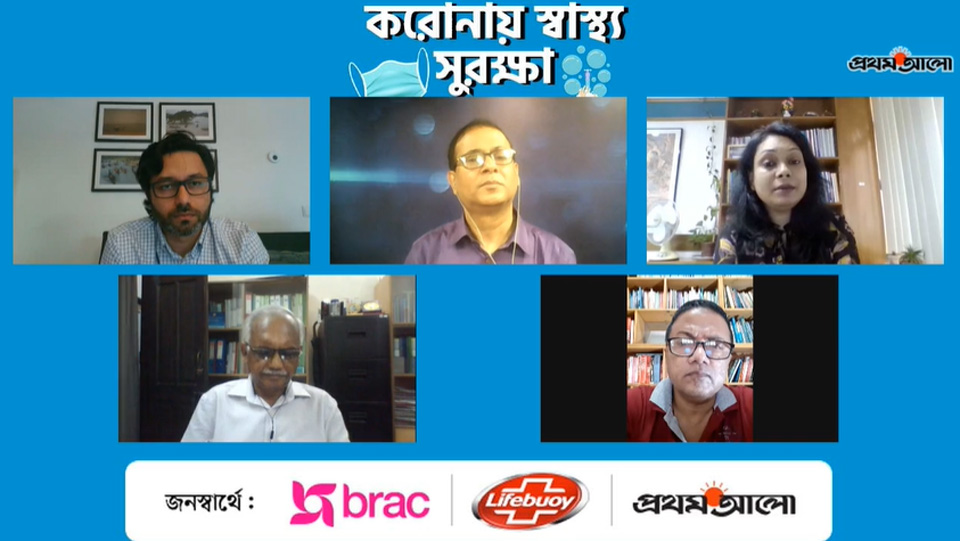
Maintaining physical distance difficult in public places
Mask causes discomfort, stuffiness
The majority of responses, 61.10 per cent, received in a recent online opinion poll viewed that many people cannot maintain safe physical distance in public spaces during COVID-19 pandemic even if they want to as others around them do not follow the rule. According to 67.40 per cent responses, wearing masks causes discomfort and heat stress, while 20.90 per cent mentioned stuffiness and difficult breathing. While 72.60 per cent viewed regular hand washing as beneficial, 6.10 percent said they simply can't remember to wash hands.
The findings of the online opinion survey, jointly conducted by BRAC and the daily Prothom Alo in association with Lifebuoy, were revealed in a digitally organised media briefing today, on Thursday (June 27, 2020). Unilever Bangladesh marketing director Afzal Hasan Khan, BRAC associate director Dr Morseda Chowdhury, and Prothom Alo special correspondent Shishir Moral joined the event moderated by Prothom Alo special news editor Shawkat Hossain.
A total of 320 thousand and 71 responses were received in the survey conducted from 31 July to 18 August (2020). The survey comprised 10 questions, five of which were on wearing masks, four on hand-washing and one on social distancing practices.
Mushtaq Hossain, former chief scientific officer, Institute of Epidemiology, Disease Control and Research (IEDCR), said, “Novel Coronavirus was first detected in our country in March and now it’s August when it is not possible for us to sit at home anymore. We have to run our daily life while maintaining reasonable behaviour and taking effective measures. The public awareness campaign with messages about health safety need to continue. Hand washing stands with soap and water should be placed where necessary, while adequate diagnosis and quarantine facilities have to be ensured. We also need sufficient numbers of volunteers in every neighbourhood to ward off the social stigma around COVID-19 infection. Such opinion polls will help us have a better picture of what’s going on in the field.”
Unilever Bangladesh marketing director Afzal Hasan Khan said, “As a brand Lifebuoy has a mission to save lives. For years and years we have been working to prevent the spread of contagious diseases by helping people maintain their hygiene. From that obligation we have joined BRAC and Prothom Alo in this initiative.”
BRAC associate director Dr Morseda Chowdhury said, “BRAC has stood by the people of Bangladesh with its army of staff since pandemic broke out. We have been working across the country with holistic measures comprising a mass campaign of personal health safety measures to raise public awareness, food and cash assistance for poor and unemployed households and other activities. We have directly provided services to 79 million people since the pandemic had begun. Such surveys are helpful in preventing COVID-19.”
Prothom Alo special correspondent Shishir Moral described at the event his field observations about the country’s corona situation and remarked, “The general public are not taking this danger quite seriously, but lack of rigorous surveillance of the situation may bring much more suffering than we have experienced till now.”
In responses to a question on how masks can reduce the risk of contracting COVID-19, 85.20 per cent viewed that wearing masks properly helps prevent respiratory droplets of sneeze and cough carrying the virus from travelling into the air, while 8.70 per cent maintained masks prevent contaminated air from entering lungs. But, 5.40 per cent responses did not simply believe that masks can reduce the risk of COVID-19.
Many responses (35.50 per cent) showed respondents washed their hands for 3-5 times the day before they participated in the survey. While 25.60 per cent respondents washed their hands more than 10 times the previous day, 27.70 per cent washed hands for 6-9 times. Alarmingly, 9% responses show they washed hands only 1-2 times.
On hand-washing habits, 38.40 per cent responses deemed forgetfulness as the biggest hurdle to wash their hands regularly. For 44.90 per cent responses unavailability of soap and water when and where necessary was the reason, while around 6.70 per cent responses said they could not wash hands regularly because soap is too costly. Another 9.20 per cent mentioned lack of time as the cause. According to most (90.10 per cent) of the responses, the standard 20-second duration rule to wash hands should be followed. However, 4.6 per cent said the standard duration should be 10 seconds.
According to 30.10 per cent responses, lack of space mainly bars people from keeping safe physical distance of 3 feet in the public spaces. However, 61 per cent responses maintained that they cannot keep the required distance as others do not always follow the rule. Meanwhile, 8.10 per cent said they just forget they should follow the safe distance rule while in a public place.
COVID-19 testing booths will remain open till 31 december
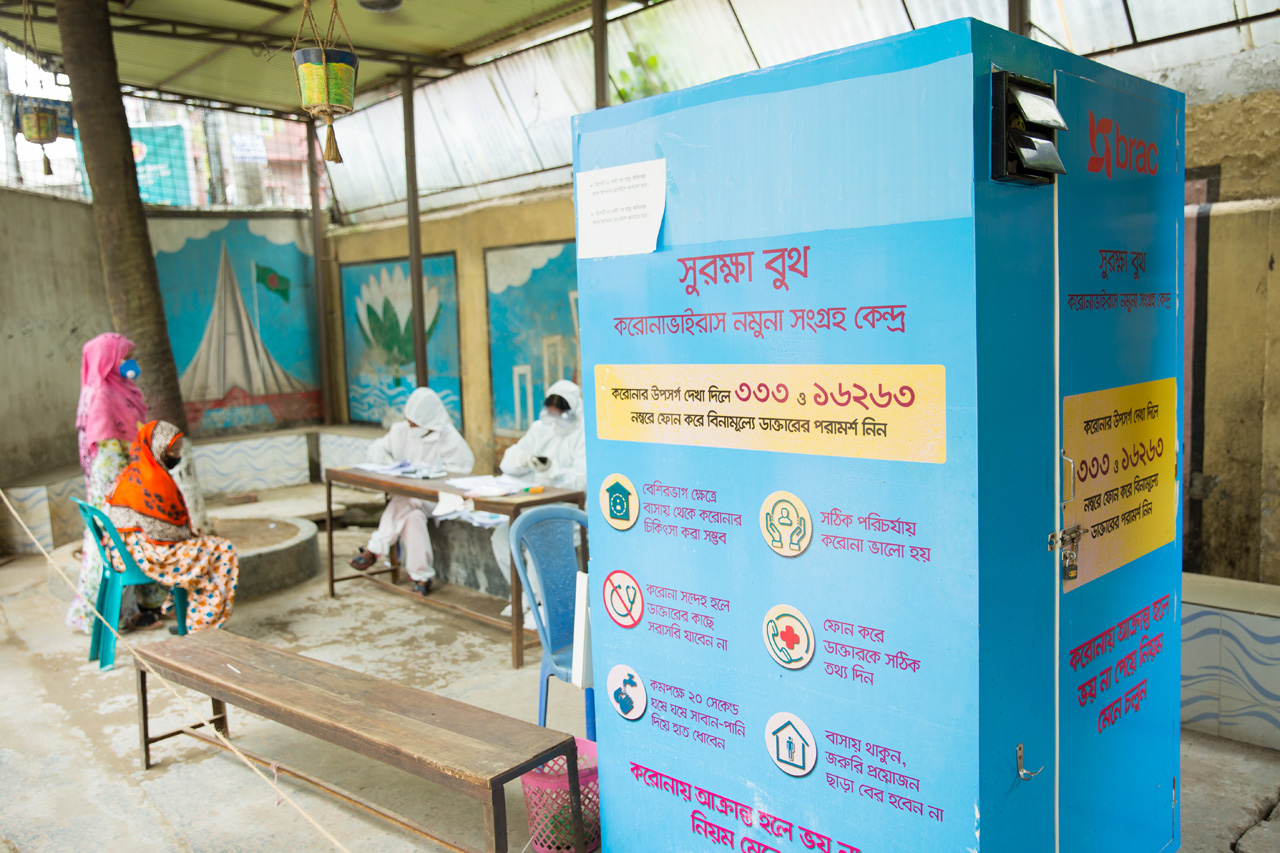
BRAC has been running 97 booths across Bangladesh for the last six months with its own funding to assist the DGHS (Directorate General of Health Services) in COVID-19 testing.
BRAC has been reaching out to donors and partners to mobilise resources. BRAC has very recently secured a donation from The Global Fund, which will enable us to keep these booths open till 31 December, 2020.
BRAC is committed to continue to support the Government and the people of Bangladesh in any national crisis. It will continue to play a key role in the pandemic response and recovery, to the best of its ability and with support from the donors and partners.
BRAC announces BDT 100 million to 50 thousand flood-hit families

BRAC will assist 50 thousand severely flood affected families with BDT 100 million (10 crore) with each family receiving BDT 2,000 as cash assistance.
The assistance will be given to families in 15 worst-flood hit upazilas in seven districts namely, Kurigram, Lalmonirhat, Gaibandha, Bogra, Serajgonj, Jamalpur and Sunamganj. The money will be sent through bKash mobile money operator.
Asif Saleh, executive director, BRAC, said, "BRAC has always stood by the people hit by natural calamities. Our staff gave relentless services in the areas hit by Aila, Mahasen, Amphan and other cyclones in the past. We are committed to stand by people seriously affected by this year's flood and give cash assistance which will help them meet their urgent necessities."
Having given a general call for assistance for the flood-hit people, the executive director further said, "We are also calling on individuals and institutions to extend their generosity towards these families in distress. BRAC has taken up an initiative to collect funds so that more families can be reached with assistance."
4.7 million people in 31 districts have been affected by flood this year with Jamalpur having most of its region inundated. So far, 41 people have died, mostly by drowning. Nearly one million households are waterlogged. Around 90 thousand people with around 76 thousand cattle are staying at emergency flood shelters.
BRAC continues its response with different initiatives since the beginning of the flood this monsoon. Early warning messages were sent through four community radio stations, social media platforms and its field staff in the remote and worst hit regions, by incorporating COVID-19 measures. Dry food and oral saline packets were distributed to the waterlogged families in Islampur and Dewanganj upazilas of Jamalpur. BRAC also installed sanitary latrines adjacent to the flood shelters at Porsha upazila in Naogaon district. Also assistance was reached to the worst suffering families in Kurigram from a fund contributed by Greta Thunberg Foundation.
Join the world’s biggest family

